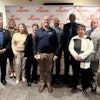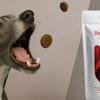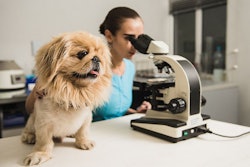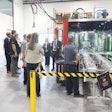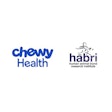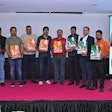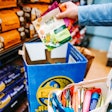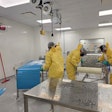Banfield Foundation, a nonprofit organization, in partnership with Humane Society of Tulsa, a leader in animal transport, unveil a custom-built, 38-foot mobile transport and disaster response truck and trailer. The new vehicle will transport 5,000 pets annually, deployed to help pets in need after a disaster and support mobile spay, neuter and adoption events across Oklahoma and the region.
Banfield Foundation grants new transport and disaster response truck and trailer to Humane Society of Tulsa named Zipper. The new vehicle’s name is in honor of a two-year-old dog named Zipper that was rescued from an overcrowded municipal shelter in Oklahoma. He was transported through the HST transport program, received comprehensive veterinary care and was ultimately adopted into a loving home in Nashville, Tennessee. Zipper is one of 12,000 pets HST has transported, housed or helped over the last 10 years.
In response to the pandemic, Banfield Foundation and HST partnered on a series of emergency pet transports, enabling access to comprehensive preventive care, relieving shelters that are at—or beyond—capacity and helping pets find loving homes. Since initiating the partnership in 2020, Banfield Foundation has helped provide comprehensive veterinary care, including vaccinations, testing, behavior assessments and more to 4,000+ dogs and cats. In conjunction with the unveiling of Zipper, the foundation is also funding preventive care for 3,500 additional pets in 2022.
"We are overwhelmed with gratitude to Banfield Foundation for its commitment to helping at-risk pets in our community, our state and our region. With Zipper, we can save animals in numbers that have never been possible before today," said Gina Gardner, president of the board of directors for the Humane Society of Tulsa. "This state-of-the-art vehicle will help us safely move pets impacted by overcrowded shelters, cruelty cases and catastrophic disasters. The impact will be felt for years for the thousands of dogs and cats that will be transported to receive much-needed preventive care and ultimately, spend their lives with loving families."
Zipper is a significant improvement over HST's current vehicle, which has logged more than 200,000 miles since 2011. The new trailer is designed to improve working conditions for the transport crew and handlers as well as the entire transport experience for the animals it serves. Zipper includes custom built kennels to maximize capacity, a fully self-contained water system, three roof top air conditioner units with heat capability, viewing windows on the outside for adoption events and disaster response sheltering. A small workspace with a sink for preparing food, medications and basic caregiving improves working conditions. Most importantly, the new vehicle can safely travel 3,500 miles each week and transport up to 80 pets each direction, which increases the numbers of pets that can be saved each year by 50 percent.
"Zipper will make a huge difference for Tulsa's critical transport work and will increase care for pets impacted by natural disasters and other community crises. The foundation plays a critical role in supporting all of these efforts by enabling the preventive care needed to ensure pets are healthy, happy and welcome in society and in our lives," said Kim Van Syoc, executive director, Banfield Foundation. "Safely moving pets from places where there are too many, to places where there are too few—it's a win for shelters that are low on space and resources; it's a win for pets that are in need of care and a family; and it's a win for adopters who are anxiously waiting to welcome a pet into their homes."
When not in use for pet transports, Zipper will play an essential role in community programs that HST has historically supported to help vulnerable pets and people stay together, including:
- Disaster Response: Zipper will be critical in every aspect of disaster—from staging and triage to transport and temporary shelter—providing the opportunity for families in human housing to visit their pets. In 2017, less than 24 hours after Hurricane Harvey made landfall, HST was on site in Houston responding to an emergency call evacuating nearly 300 dogs and cats. In 2019, Tulsa and Northeast Oklahoma experienced historic flooding. HST evacuated three municipal shelters and transported more than 500 shelter pets. In response to Hurricanes Michael, Florence and Laura, HST transported critical medical supplies, vaccines, volunteers, and search and rescue equipment into the hardest hit areas. In 2021, HST transported nearly 400 pets out of at-capacity shelters in Louisiana as Hurricane Ida prepared to make landfall.
- Adoption: Prior to the pandemic, HST's previous vehicle served as a monthly mobile adoption site across Oklahoma. HST has successfully helped adopt more than 2,500 pets through these mobile events. The addition of Zipper will help continue and expand this type of work.
- Animal Welfare: HST has responded to 47 law enforcement cases for puppy mills, hoarding, and animal cruelty during the last decade, transporting more than 3,000 animals for law enforcement offices without sheltering facilities or animal-specific resources.
- Community Outreach: HST has distributed more than 100,000 pounds of pet food to homeless families and housed their pets during extreme winter conditions. During the pandemic, 65,000 pounds of pet food was distributed throughout Northeast Oklahoma.
- Spay/Neuter Clinics: HST utilized its previous vehicle to serve as a mobile recovery unit for pets who are sterilized during large scale, often outdoor, spay/neuter events. The vehicle was also used as a temperature-controlled surgical recovery ward with more than 100 pets recovering in a single day. In addition to Oklahoma, HST's unit was part of MASH clinics in Louisiana, Arkansas, Texas and South Dakota. Zipper will support more mobile spay/neuter clinics by providing a safe and comfortable recovery area despite harsh temperatures and weather conditions and provide community transport to clinics when transportation is a community-identified barrier.
